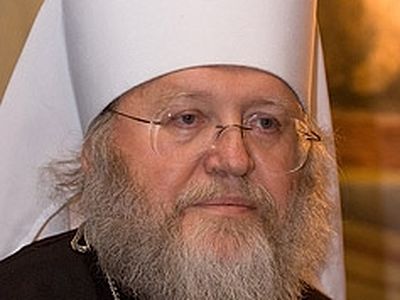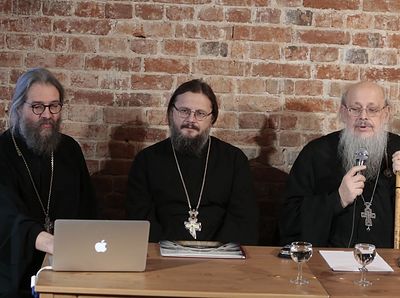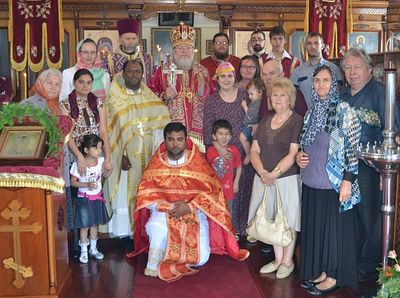Whoever has been to an ordination knows how grace fills the church at the moment of the imposition of hands…. Joy fills the hearts of those praying, even if they do not personally know the person being consecrated to the priestly rank. With what stateliness and joy do they sing the troparia “Holy Martyrs,” “Glory to Thee, O Christ God,” and “Dance, O Isaiah”! The man being consecrated to the priesthood is ascending, as it were, to Golgotha, but it even fills him with joy, just as it filled certain martyrs who were going to their own executions. It is as if the Lord carries the one being ordained in His hands, grace abounds, as if giving the newly-consecrated a foretaste of what he will later have to labor with sweat and blood for.
 Ordination to the priesthood. Photo by Anton Pospelov / Pravoslavie.ru
Ordination to the priesthood. Photo by Anton Pospelov / Pravoslavie.ru
Indescribable is the Sacrament of the Priesthood. Its burden is borne with fear and trembling, knowing one’s own unworthiness. It is fearful to read about it. Protopresbyter Alexander Schmemann said the daring words: “The hands of the priest during the Eucharist are the hands of Christ Himself. St. John Chrysostom tried to avoid the priesthood; St. Nicholas of Myra, St. Ambrose of Milan, St. Epiphanius of Cyprus, and many others were set upon the lampstand of the Church against their own will, through a special miracle of God.
Many people of holy life so rigorously avoided the priesthood that some of them even went so far as to maim themselves! In one city, the people wanted to have St. Ammon as their bishop. The citizens came to Bishop Timothy and besought him to ordain Ammon. Timothy had nothing against this. Then the people went to get Ammon, but the saint fled from them. The citizens ran faster, and seeing that they were catching up to him, Ammon stopped and began to refuse with tears. The people nevertheless did not listen to him. Then the saint swore to them that he would not accept holy orders and would not leave the desert. When even this did not work, he took a pair of scissors in front of everyone and cut off his left ear with the words, “Now you must understand that I cannot be ordained, as you are trying to force me to do” (according to the Church canons, it is forbidden to ordain a maimed man). After this the people went to the bishop and told him everything. To this he replied, “Let the Jews obey this law, but if you bring to me even someone without a nose, but of a worthy life, I will ordain him.” The citizens went again to implore Ammon. When the saint began to refuse, they would have taken him by force. But he swore that he would cut off his tongue, too, if they started to force him. After this they left him in peace.
 Elder Paisius of the Holy Mountain
Elder Paisius of the Holy Mountain
"But in that case," objected the Abbot, "even the cook has an impediment, because he fed the soldiers who killed people."
"I don't know," answered the elder, "whether the cook has an impediment—I only know that I won't be a priest."
Many people who have accepted the priestly rank out of humility and obedience have nevertheless later tried to live their lives apart from the obligations of this rank.
In the Patericonii there is such a story. Abba Muthues set off with his brother out of some necessity from Raithu. In Gebal the bishop detained them and consecrated them to the priesthood. Both of them reached the end of their lives without having once approached the altar to serve the Eucharist. St. Muthues said concerning this, "I believe in God, that I will not be subjected to great condemnation for the fact that I have not served a liturgy after my ordination, for it is the blameless who ought to accept ordination." St. Philemon, who is mentioned in the Philokalia, behaved in the same way. In his extreme humility, he very rarely agreed to serve.
Heavy is the burden of the priesthood, and especially of the rector's position, because from the time that a man dons the epitrachelion [priest’s stole], he can no longer think about only his own salvation. In addition to the woes about his own salvation and that of his spiritual children are added the cares of this world. How can we renovate the church building? Where can we get money for those who work and serve in the church? Satan cleverly puts the priest in a situation where he becomes in actual fact not a man of prayer, but a builder or contractor; not a father-confessor, but an entrepreneur or farmer! It is amazing, but it is not just a sickness of our own times. It was almost always this way. One need only read the letters of Holy Hierarch Ignatius (Branchaninov) to Count Sheremetev. At that time they were finishing renovation work on the St. Sergius Hermitage near Petersburg, where St. Ignatius was the Superior. The bishop borrowed a large amount of money in order to pay the workers, and used up all of his own savings as well. That is why in a humble—almost begging—way the bishop asked the Count for help. It is impossible to read this letter—as well as the letter in which he thanks the Count—without being moved…
But what are the service of the priest and the superior compared to the service of the bishop, who faces daily dying for the whole Church? Knowing the impossibility of combining the double podvigiii of a bishop’s own salvation (in the Great Schema) and the obligations of governing the Church, the holy fathers made a statute that a bishop cannot be a schema-monk. The life of a schema-monk and the life of a bishop are completely different. And if a bishop wishes to take the Schema, it means that he also wishes to resign as bishop.
 St. Sergius refusing the episcopal rank
St. Sergius refusing the episcopal rank
“If any man desireth the office of a bishop, he desireth a good work” (I Tim. 3:1), says the Apostle Paul. However, in practice, we see that few people desire the episcopate itself—few holy people. St. Sergius of Radonezh categorically refused the request of Metropolitan Alexis of Moscow to become his successor. He refused, and after Metropolitan Alexis’s death, the time of strife “between the bishops” began. Well known is the story of the “self proclaimed” holiness of Mityai, and the troubles and woes of Sts. Cyprian and Dionysius. It would have been right for St. Sergius to agree to Metropolitan Alexis’s offer—then all of that wouldn’t have happened. But the saint considered the well-being of his soul to be a greater thing than the dubious well-being of the episcopate. In a similar situation, St. Theodore the Sykeote did give way to requests, but spent only a couple of years in the rank of bishop, and then retired into silence. St. Ignatius (Branchaninov), St. Theophan the Recluse, and many other saints also retired from the bishopric.
At times the bishopric and one’s personal salvation enter into such conflict that some holy bishops have fled from the cathedra as from a house on fire. St. John (commemorated on December 3 O.S.) was bishop of Colonia in Armenia for about 10 years. Out of the necessity of his episcopal duty he was forced to investigate some political issues. And, as it says in his life, “seeing the vanity and rebellion of the world,” he resolved to leave the episcopate. One day after liturgy he dismissed his clergy, secretly set off for the coast, and sailed to Jerusalem. God showed him the place of his salvation in the Lavra of St. Savvas the Sanctified. John came to the Lavra as a simple novice. At that time the Father Superior of the Lavra was the God-bearing Savvas himself; about 140 brothers labored in spiritual struggles under his direction. Savvas was already a famed father and had the gift of clairvoyance, but, remarkably, the Lord hid John’s rank from him.
 The Lavra of St. Savvas the Sanctified
The Lavra of St. Savvas the Sanctified
St. John carried on his spiritual struggles for some years at various obediences. He served the workers, carrying them food on his shoulders; then he labored in the monastery guesthouse; then Savvas made him the monastery steward. Seeing that John was a perfect monk and that God blessed whatever he did, Savvas planned to ordain him a priest. He took John, set off with him to the Patriarch of Jerusalem, Elias, and besought him to ordain John. The Patriarch was not against this, but at that point the “novice” called the Patriarch aside with the words, “Most honorable Father, I would like to reveal to thee a secret. Allow me to speak with you alone, and if you acknowledge me to be worthy of the priestly rank, then I shall not refuse.”
When the Patriarch had stepped aside with him, St. John fell at the Patriarch’s feet, adjuring him not to reveal his secret to anyone. When the Patriarch had promised this, John said, “Father! I was the Bishop of Colonia. Because of my many sins I left the episcopate, fled, and condemned myself to serve the brethren.”
The Patriarch was horrified at these words, called St. Savvas and told him that there was no way that John could be a priest. After this the Patriarch dismissed them both.
The whole way back Savvas was tormented with doubts. He withdrew a respectable distance from the Lavra, found a cave, and prayed the whole night in it with tears.
“Why, Lord,” said he, “did You disdain me, hiding John’s life from me? I was deceived in accounting him worthy of the rank of priest! Disclose to me now the truth concerning him! Could it be that the vessel that I accounted chosen, holy, and worthy is before Your majesty both worthlessiv and unworthy?”
God answered his prayer. An Angel appeared to Savvas and said, “John is not a worthless vessel—he is a chosen one. But, he is a bishop and cannot be ordained a priest.”
Thus the Angel spoke and became invisible. St. Savvas joyfully hurried to John’s cell, embraced him and said, “Father John! You hid from my sight what a gift of God is in thee, but God has revealed it to me.”
“I am very sorry about that!” answered John. “I had not wanted anyone to know my secret, and now I shall have to leave.” Savvas swore to John that no one would find out about him. Thus St. John lived to his dying day, devoting himself to the works of a monk, and not to the affairs of a bishop.
 Before ordination. Photograph by A. Pospelov / Pravoslavie.ru
Before ordination. Photograph by A. Pospelov / Pravoslavie.ru
The Church commemorates another bishop who quit the episcopate, on February 29 O.S. He was also called John, and was the archbishop of Damascus. When he had been at his see only a short time, the saint secretly withdrew to Alexandria, changed his name to Barsanuphius, and came to Mount Nitria. There he fulfilled various obediences in the rank of a simple monk.
One of the monks—a man of feeble mind—greatly irritated the saint. Sometimes he would call him names, and sometimes he would throw the dirty dishwater at him. Finally he drilled a hole in the wall of his cell and began to “answer the call of nature” onto the holy archbishop’s bed, so that the bed began to stink. The monks realized what the matter was and reported it to the abbot. When they wanted to punish the guilty monk, the saint fell at the abbot’s feet and told him with tears that he himself was to blame in everything. “I myself,” said the saint, “irritate the brother and arouse his anger—forgive him for the Lord’s sake.”
And thus the brother was saved from punishment. Eventually the saint was recognized and fled from there, too—this time into Egypt…
Indescribable is the sacrament of the Priesthood… Its burden is borne with fear and trembling, knowing one’s own unworthiness.
The priest is the foal of the ass on which Christ enters into Jerusalem. Everyone is bowing, laying down mats and clothing, waving palm branches, and the donkey thinks, “Look what honor they hold me in.” And he does not know, foolish little donkey, that it is not him that they are greeting, but Christ the Savior. Thus, too, the priest sometimes basks in everyone kissing his hand and calling him “Father”—sometimes he even sees good results from his prayers, and begins to forget that it is His right hand that gives the blessings and that the people kiss, and that He works the miracles…
 The Battle for Maloyaroslavets, 12/25 October, 1812. Artist: Alexander Averianov. Fragment. In the ranks of the soldiers is the priest Vasili Vasil’kovsky with a cross in his hands.
The Battle for Maloyaroslavets, 12/25 October, 1812. Artist: Alexander Averianov. Fragment. In the ranks of the soldiers is the priest Vasili Vasil’kovsky with a cross in his hands.
A man desiring the priesthood is stepping onto a contradictory path. On the one hand, a desire for the priesthood is the first sign of pride, and the first sign that this man should not be ordained. But on the other hand, “If any man desireth the office of a bishop, he desireth a good work.” For a man entering a seminary also desires the priesthood. Certainly here the sinful inclination would be when you want to be a priest no matter what, in spite of God’s will, as the accursed Mityai in the times of Sergius of Radonezh desperately wanted the metropolitan see—and drowned in the sea. If, however, this desire is tranquil, giving itself up to the will of God, there is no sin in it. If it is out of love for the Church, the divine services, and God, then it is “a good work.”
Everything that has been said relates not only to the priesthood, but also to any obedience in the Church. One may desperately strive to be in the choir, to have the position of choir director, sexton, Sunday school teacher, or even candle-lady. To envy those who fulfill this obedience and to dream that you have done what was asked of you is far better.
Therefore let us all, brothers and sisters, learn divine humility from our holy father—from John the Silent, Bishop of Colonia; from John-Barsanuphius, Archbishop of Damascus; from Athanasius of Athos, who was a highly educated theologian of his time but who gave himself over to obedience to an elder and pretended to be uneducated, for his humility’s sake; from John of Damascus, the greatest hymnographer and theologian of the Orthodox Church, whose elder, in punishment for his disobedience in writing the funeral hymns, made him clean the latrines of the whole monastery—and the mellifluous John fulfilled this epitimia with joy…
Let us learn humility and humble ourselves: before our co-workers and friends, before superiors and subordinates, and of course, before our own close ones—husbands, before their wives; wives, before their husbands. Let us not regard it as humiliation to ask forgiveness even of our own children if we are in the wrong. And then each of us will be a true priest (cf. I Peter 2:9), immolating his own will and bringing to God the true sacrifice of a broken and humbled heart. Amen.
i proskomidé (pronounced –proskomidee (Greek) or proskomidia (Russian).
ii Lives of the Desert Fathers
iii spiritual struggle
iv The word nepotrebnij can mean both “worthless” and “dissolute.”



